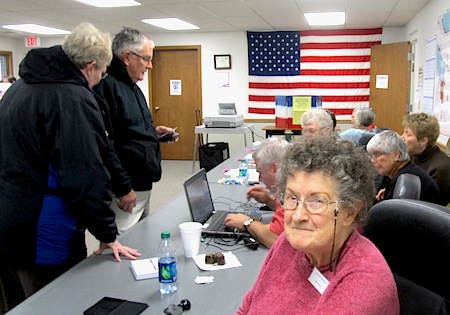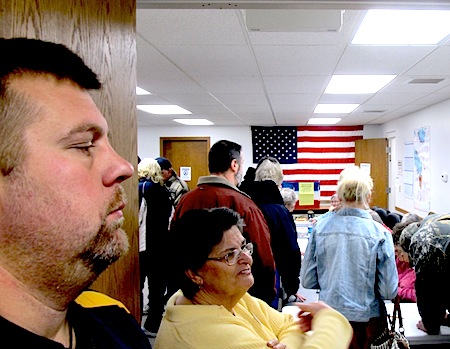
It takes a transcendant candidate — a Bill Clinton, a Ronald Reagan — to beat an incumbent president. Mitt Romney, who’s repudiated his signal achievements as a governor and shifted views as often as the game plan strategy required, certainly is not that. So I anticipate that Barack Obama will win a second term today, an honor that he has earned and deserves.
Still, we are a dangerously immature country. How does a president govern a nation that is so well set up to argue? The answer: he really can’t.
It takes a near-revolution to do anything of substance. Passing a national health care program birthed a radical right wing of the G.O.P. that made compromise and consensus dirty words. Changing the influence of unions and collective bargaining rights in state government generated weeks of protest and an unsuccessful gubernatorial recall in Wisconsin. Try to finance a high-speed rail network in the Midwest to speed travel and develop new corridors of commerce and two conservative governors refuse to take the money. Develop technology to produce record levels of natural gas, a much cleaner fuel than oil or coal, and reduce U.S. climate changing emissions to the lowest levels in a generation, and the major environmental organizations attack the breakthrough as too dangerous to pursue.
Our new national DNA is “do nothing anywhere.” We are so unwilling to take risks. We are so afraid of seeing hard choices and big threats as the ready bricks to build new towers of opportunity. So we fight and make stopping stuff from happening instead of finding ways to solve differences to make the country better.
Yesterday in Traverse City I talked about this with Jeff Smith, a friend for years and the accomplished editor of Traverse Magazine. I suggested we needed a party of radical pragmatists that could clear political space for people to learn from each other, develop trust, and actually implement hard decisions that matter. For instance, there’s a big stretch of scientific, resource, and economic ground between the coal industry that wants to remove mountaintops in Appalachia and the green community that wants to stop hydro-fracking to develop natural gas. When it comes to the proven risks to air, water, land, and health, a few deep shale wells in Ohio look to me like a much safer option than a mountaintop removal in West Virginia.  “I know,” he said. “We need a place for people in the middle to get mad about how the ideologues on both sides control the debate.”
Today, I showered and had breakfast and then walked from my house to Benzonia Township to vote. I did so with some sadness. My melancholy isn’t about Republicans or Democrats. It’s about us. For every American convinced that climate change is a hoax there’s another American worried about bats or “infrasound” or property values and standing in the way of a wind park. For every rural resident who believes public transit is a waste of money there’s a suburbanite who doesn’t want the train running next to his house. For every man who works with his hands and is ready to eliminate taxpayer funding for public two- and four-year colleges, there’s a young Stanford graduate, content in a blossoming career, and sniffing at how anybody could be so stupid to vote against their self-interest.
The truth is that we’ve all made voting against our self-interest a national priority. Drought and crop failures in the Midwest helped raise grain prices to record levels and made a bag of groceries at my local supermarket cost over $30.
Floods and tornadoes killed hundreds of Americans this year and wrecked dozens of towns and tens of thousands of homes. A mammoth storm drowns New York, the second time in seven years that a U.S. city is inundated by a monster hurricane. But instead of reaching out, palms up, to acknowledge the threat and ask what we need to do to protect our people, our land, our economy, we stiff arm each other, palms out. It’s an act of God. It costs too much. It’s too complicated. Let’s just rebuild in the same paths of ruin.
The public mood is so hollowed out, our intelligence numbed by two decades of fighting and fear, that what serves as political dialogue has devolved to ideological fanaticism, party-led ruthlessness, and economic heedlessness. The result is that dysfunction and disinvestment define America’s painful era of national reckoning and stagnation.
I wasn’t happy voting today, as I normally am. Obama will win the election. But he’s being asked to lead a country — nervous, buffeted, unsure — that I hope will soon see itself again as smart, courageous, and a winner.
— Keith Schneider


Thank you so much for sharing your thoughts on this day, I so appreciate your point of view. Enduring American politics is like having a wound that won’t heal no matter how much you think you have given it the best treatment.
i think you nailed it here!
I long for a governing system that is more that two voices shouting at each other, one were lobbyists are not more important than
Individual constituents. We are so stagnant, our society has no vision for its future and tries so hard to cling to old ways thinking that change, and difference between People, are still too threatening.
I did vote and I hope that Obama does get four more years, but I look to
Grassroots support as the sustaining elixor to help carry me through.
Beat wishes to you.
rea do not understand.
Thank you Keith for so poignantly describing the dis-ease that is crippling
the country our parents so desperately believed in. I agree, we need a new path to critical thinking.
Joyce and Jeff, thanks and hang on to your hats. The next four years is going to be a ride. Keith
Deborah Perloe commented on your link:
Deborah wrote: “The whole concept of “voting against one’s self-interest” came from Democrats in shock of what working-class Republicans were doing to themselves. Repubs were sacrificing their economic interests in order to vote for candidates who shared their conservative social issues (e.g., mostly abortion rights, which should not be legislated against others no matter what one believes). Republicans are still voting this way!”
Deborah Perloe:
We are not “all voting against our self-interest.” That may be the pattern of Republicans since “What’s the Matter with Kansas” but it’s not true of many Democrats and I know a lot of them from all income levels.
Deborah Perloe:
I agree with a lot of your blog but I differ with you on one big point. Saying “The truth is that we’ve all made voting against our self-interest a national priority.” That is a sweeping generalization that I believe and know for myself and many others is incorrect, at least for Democrats. It’s been true of Republicans for a long time (e.g. “What’s the Matter with Kansas” still stands). Have you talked with people in strongly Democratic states? Incidentally, I agree very much with you on environmental groups. I have yet to find one that I want to join. Hope you’re happier now than when you were when you wrote your blog.